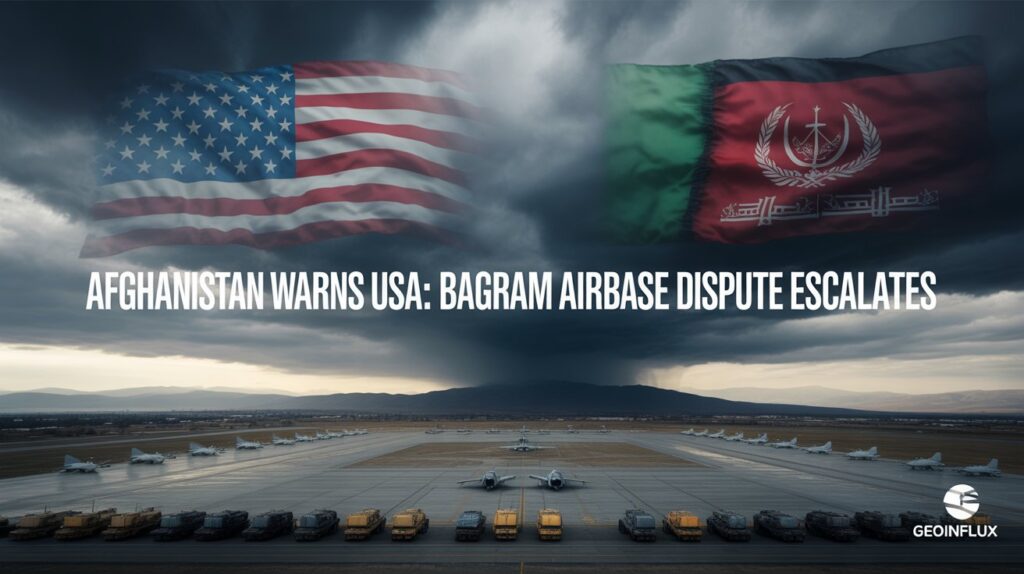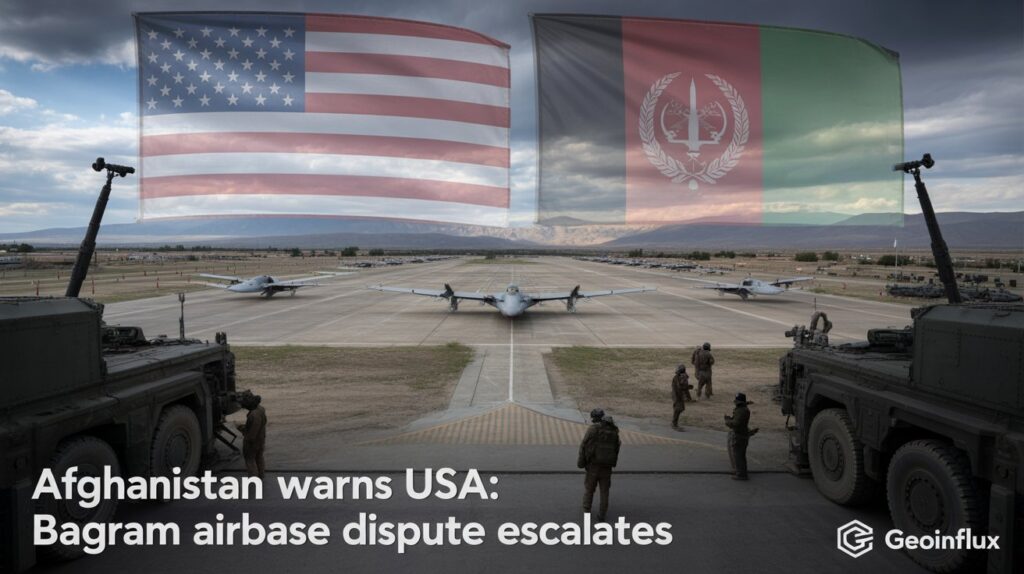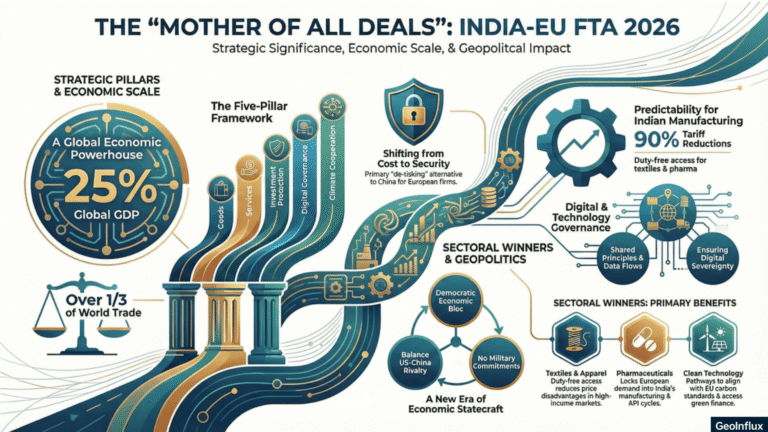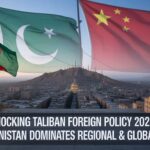Afghanistan warns USA over the explosive Bagram Airbase dispute as Trump Afghanistan policy revives old tensions. Taliban rejects US demands, reshaping US-Afghanistan relations 2025 amid frozen assets, China, and regional security risks.
Introduction: Why Afghanistan Warns USA?
Afghanistan warns USA with a direct message: “The Bagram Airbase dispute is non-negotiable“. As Trump Afghanistan policy takes a hardline turn, the Taliban rejects US demands and threatens a 20-year war if Washington insists on reclaiming the base. This escalating crisis marks a turning point for US-Afghanistan relations 2025, with implications for China, Russia, and regional security.
Also Read: South Asia News
Why Does the Bagram Airbase Dispute Matter?
The Bagram Airbase dispute lies at the heart of the current standoff. Once the central hub of US military presence Afghanistan, Bagram is now fully under Taliban control. Its strategic value extends beyond Afghan borders—situated near western China, it is critical for monitoring China nuclear sites Afghanistan, including Lop Nur.
For the Taliban, refusing to return the base is about Afghanistan sovereignty and resisting foreign dominance. For the US, losing control of Bagram threatens its ability to project power in South Asia and keep pressure on militant groups.
Latest on GeoINflux
India-EU Free Trade Agreement 2026 Explained: Why the “Mother of All Deals” Is Reshaping Global Trade and Power
What Is the Taliban’s Position on US Demands?
The Taliban rejects US demands in the strongest terms. Officials have declared “not an inch of land” will be ceded, even if Afghanistan faces a 20-year war warning. This position reflects Taliban foreign policy 2025, built on resistance to foreign intervention and pursuit of legitimacy without dependency on the West.
By refusing Bagram, the Taliban aims to cement its image as a defender of Afghan sovereignty, while leveraging Afghanistan assets freeze in Western banks as a potential bargaining chip.
How Is Trump’s Afghanistan Policy Escalating the Crisis?
Trump Afghanistan policy is reviving old tensions by demanding the return of Bagram Airbase and threatening “bad things” if Afghanistan refuses. His approach combines military warnings, economic leverage, and possible sanctions, reminiscent of America’s earlier strategies.

The policy also links directly to US withdrawal legacy, as critics argue Trump’s aggressive push undermines the very premise of America’s 2021 exit. By reigniting disputes over bases and recognition, Trump risks dragging the US back into long-term confrontation.
How Are US-Afghanistan Relations in 2025 Being Redefined?
US-Afghanistan relations 2025 are strained like never before. The standoff over Bagram symbolizes deeper fractures: frozen Afghan reserves, humanitarian concerns, and America’s reluctance to recognize the Taliban government.
Washington accuses Kabul of harboring militants and aligning too closely with China and Russia. Meanwhile, Afghanistan insists the US cannot dictate terms after the withdrawal. This clash reveals a fragile balance, where diplomacy may fail, and renewed military escalation looms.
What Are the Wider Geopolitical Implications of Afghanistan Warns USA?
The Bagram Airbase strategic location makes this dispute a global flashpoint. Beyond Afghanistan warns USA headlines, the crisis reverberates through Asia.
- China sees opportunity to strengthen ties with Kabul while countering US influence near its sensitive nuclear facilities.
- Russia frames the dispute as evidence of declining US hegemony, offering support to Taliban diplomacy.
- India remains cautious, aware that renewed US military presence Afghanistan could fuel instability along its borders.
In short, the Bagram Airbase dispute ties directly to global competition, where every move reshapes power alignments.
What Are the Economic and Humanitarian Stakes?
The Afghanistan assets freeze remains a key tool in US strategy. Billions of dollars held abroad are blocked, crippling Afghanistan’s economy. Trump’s administration hints these funds could remain frozen unless Kabul compromises.
At the same time, humanitarian conditions worsen. International aid flows have shrunk, and ordinary Afghans face food insecurity and lack of basic healthcare. Analysts warn that if the standoff persists, civilians—not politicians—will bear the brunt of the conflict.
How Might This Dispute Evolve in the Long Term?
The Taliban’s Afghanistan 20-year war warning suggests Kabul is prepared for prolonged resistance. If the US escalates, scenarios include:
- Renewed drone strikes and covert operations.
- Increased Taliban-China-Russia alignment.
- A possible NATO split if allies resist another Afghanistan intervention.
Alternatively, a negotiated settlement could emerge, involving partial unfreezing of assets, recognition talks, or limited counterterrorism cooperation. Still, the risks tied to US withdrawal legacy make compromise difficult.
Recap: What Are the Key Takeaways?
| Question | Key Insight |
|---|---|
| Why is Afghanistan warning the US? | Because of the Bagram Airbase dispute and sovereignty concerns. |
| What is the Taliban’s stance? | Taliban rejects US demands, even if it means a 20-year war warning. |
| How is Trump affecting the crisis? | Trump Afghanistan policy revives disputes and threatens escalation. |
| What is the global impact? | Bagram Airbase strategic location ties the issue to China, Russia, and India. |
| What’s next? | US-Afghanistan relations 2025 face uncertainty, with risks of conflict or fragile negotiations. |
FAQs
Why is the Bagram Airbase dispute central to US-Afghanistan tensions?
The Bagram Airbase dispute is central because it represents both a strategic military asset and a symbol of sovereignty. For the US, losing access to Bagram undermines its ability to monitor China nuclear sites Afghanistan and maintain counterterrorism reach in South Asia. For Afghanistan, holding Bagram signals independence and rejection of foreign dominance. This makes compromise extremely difficult.
What does the Taliban’s 20-year war warning mean?
The Taliban’s Afghanistan 20-year war warning is not mere rhetoric—it reflects a deep commitment to resisting external pressure. Taliban officials argue that even if the US imposes sanctions or military strikes, Afghanistan will fight to retain sovereignty. The warning is also a political message to allies like China and Russia, emphasizing that Kabul will not bow to Washington.
How does Trump’s Afghanistan policy differ from previous strategies?
Trump Afghanistan policy differs by returning to coercion after the US withdrawal legacy. While earlier administrations focused on disengagement, Trump’s demands for Bagram Airbase suggest a willingness to reignite confrontation. His threats link military power with economic pressure, especially Afghanistan assets freeze, showing a hybrid of hard and soft pressure tactics.
How are US-Afghanistan relations 2025 shaped by frozen assets?
US-Afghanistan relations 2025 are largely hostage to Afghanistan assets freeze. With billions blocked in Western banks, the US uses this as leverage to pressure Kabul into concessions. The Taliban rejects this approach, arguing it punishes Afghan civilians. This stalemate prevents constructive engagement and adds to humanitarian suffering.
Could the Bagram Airbase dispute trigger regional instability?
Yes, the dispute could destabilize South and Central Asia. The Bagram Airbase strategic location makes it vital for both US influence and China’s security calculations. If the US attempts to retake the base, regional actors like Russia, Iran, and Pakistan will be forced to choose sides. This could further complicate alliances and intensify global rivalry.
References: What Are the Sources of This Analysis?
- Al Jazeera – Trump warns Afghanistan
- Indian Express – Why Trump wants Bagram
- NDTV – Taliban rejects Trump
- Reuters – Trump says bad things will happen
- Chatham House – West in Taliban-ruled Afghanistan






Pingback: Netanyahu UN Speech 2025: Why Did World Leaders Walk Out Over Gaza And Palestine Recognition? GeoInflux
Pingback: Why India Firmly Says No To US Bagram Air Base Afghanistan: 5 Geopolitical Shocks | GeoInflux GeoInflux